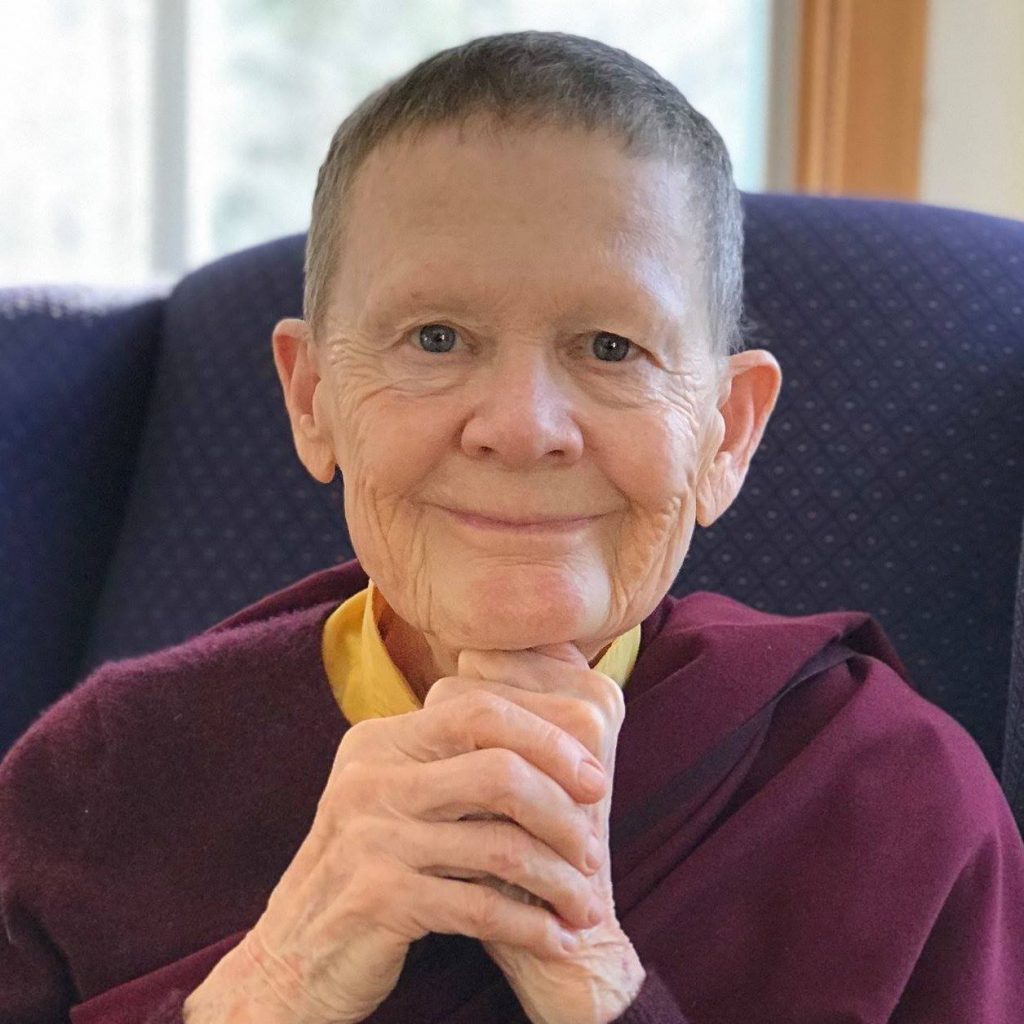The American Buddhist nun and bestselling author Pema Chödrön has stepped down as an acharya (senior teacher) at Shambhala International in response to the group’s handling of the allegations of sexual abuse against Shambhala lineage holder Sakyong Mipham Rinpoche. Pema Chödrön, who had remained a part of the organization after the Sakyong stepped away from teaching and administrative duties, decided to resign after the Sakyong announced that he would resume teaching and a transitional board of directors invited him to lead an upcoming event in France.
In her letter to the board, released publicly on January 14, 2020, Pema Chödrön wrote, “I have decided to step down as an acharya. As you know, I haven’t actually served as an acharya for a long time, and I have been considering retiring for a few years. And now, the time has come.”
She said she was “disheartened” at the Sakyong’s decision to start teaching again:
I experienced this news as such a disconnect from all that’s occurred in the last year and half. It feels unkind, unskillful, and unwise for the Sakyong to just go forward as if nothing had happened without relating compassionately to all of those who have been hurt and without doing some deep inner work on himself.
Then came the letter from the Board informing the Shambhala community that they have invited the Sakyong to give the Rigden Abhisheka [an initiation ceremony] in June, and I was dumbfounded. The seemingly very clear message that we are returning to business as usual distresses me deeply. How can we return to business as usual when there is no path forward for the vast majority of the community who are devoted to the vision of Shambhala and are yearning for accountability, a fresh start, and some guidance on how to proceed? I find it discouraging that the bravery of those who had the courage to speak out does not seem to be affecting more significant change in the path forward.
On June 28, 2018, the advocacy group Buddhist Project Sunshine released the second in a series of reports detailing sexual abuse and misconduct by Shambhala teachers and staff, including senior leaders and the Sakyong. On July 6, 2018, the Sakyong announced his decision to step away from teaching and administrative duties, and the Shambhala board of directors resigned, putting in place the interim board. The new board hired the law firm Wickwire Holmes to investigate the claims and on February 3, 2019 released to the Shambhala community the full report, which confirmed some of the allegations against him.
Recently, a group of 125 students in Europe asked the Sakyong to continue teaching, and he and the board said they agreed to the request.
Ani Pema said in her letter, “I understand that the Board’s decision to invite the Sakyong was based on the compassionate intention to benefit the 125 people who wish to take the abhisheka in order to continue on their path. But for me, personally, to have the very first indication of how we are going to manifest be that we are returning to business as usual is shocking and also heartbreaking.
“Hopefully, it’s not too late to reverse this trend.”
Pema Chödrön, born Deirdre Blomfield-Brown, became one of the first Westerners to ordain as a Buddhist nun in 1981 under Shambhala founder and the Sakyong’s father, Chögyam Trungpa Rinpoche. In 1984, she established Gampo Abbey, one of the first Tibetan Buddhist monasteries in North America, in Cape Breton, Nova Scotia. Since then, she has become perhaps Shambhala’s most high-profile teacher, writing several bestselling books, including When Things Fall Apart: Heart Advice for Difficult Times (Shambhala Publications, 1996), and recently appearing in an hour-long interview with Oprah Winfrey, where she spoke about the issues at Shambhala.
As Pema Chödrön sent her letter, senior teacher David Schneider also announced that he was stepping away from his acharya role. He wrote in a public statement: “I did not myself see the things initially alleged against the Sakyong; but I did observe, and I was part of, an unhealthy, selectively hierarchical system of privilege and power, one that led to many people getting hurt, women mostly. I personally tried never to cause harm, but I am sure that through the years, I have done so. This will have come from my stupidity, greed, and concupiscence. These qualities, and actions arising from them, are a source of personal shame and of karmic consequence. I can only hope to find forgiveness.”
Pema Chödrön closed her letter by thanking the other acharyas for “the admirable work they have done to stabilize the community’s finances and to establish a new and more efficient code of conduct,” adding, “Nevertheless, I do not feel that I can continue any longer as a representative and senior teacher of Shambhala given the unwise direction in which I feel we are going.”
Update: Ani Pema Chödrön would like to clarify that in her letter to the Shambhala International board of directors, her reference to “retiring” was meant to refer to her role as an acharya in the Shambhala community. She is not retiring from teaching.
Thank you for subscribing to Tricycle! As a nonprofit, we depend on readers like you to keep Buddhist teachings and practices widely available.
